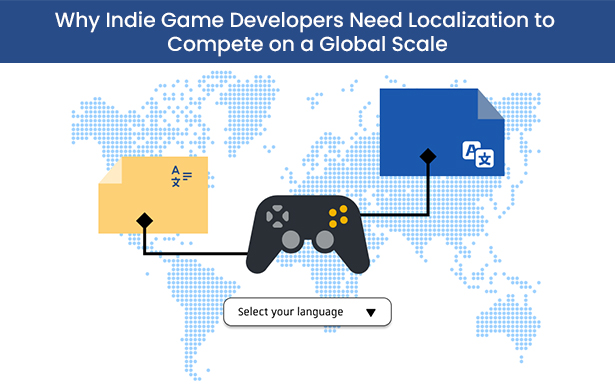
The indie game development scene is at an all-time high. With platforms such as Steam, Epic Games Store, PlayStation, Xbox, Nintendo Switch, and mobile app stores giving independent developers a global stage, it's now possible for a small team, or even a solo developer, to create and distribute games to millions of players worldwide. However, despite this access, one crucial component often separates breakout hits from games that go unnoticed across international markets: localization.
In an industry where user experience is everything, localization isn't just about translating text. It’s about making your game connect with players in different regions and cultures. If you’re an indie developer aiming for global success, localization is not optional but essential.
Let’s explore why localization is a game-changer and how it can help your indie title compete on a global scale. To learn more or begin your localization journey, feel free to call us at +91 8237060559 Our team would be happy to assist you.
When you publish your game online, you're not just targeting players in your home country—you’re launching into a worldwide marketplace. Gamers from countries such as China, Germany, Brazil, Japan, and France expect experiences in their native language. A game that lacks proper localization risks alienating these audiences from the very beginning.
According to reports, more than 70% of global users prefer content in their own language, even if they’re fluent in English. Additionally, localized games see up to 60% more downloads and better reviews than non-localized versions. Localization instantly boosts your game’s discoverability and appeal across borders.
A common misconception among indie devs is that localization is just translating in-game dialogue. In truth, localization involves adapting to everything, such as:
For example, jokes or idioms that work in English might fall flat or even be offensive in another language. Localization ensures that the tone, emotion, and context of your game feel natural to the target audience.
A professional localization service provider can also perform culturalization, which helps adapt graphics, colors, character names, and even game mechanics to match local expectations and cultural norms.
Players are far more likely to engage with and stick with a game that speaks their language. If your game is hard to navigate or confusing due to poor or missing translations, users will likely abandon it, no matter how great the gameplay.
A properly localized game leads to:
This engagement directly translates into increased revenue and a larger player base—especially for free-to-play games or those with microtransactions.
With thousands of indie games released every year, competition is intense. One of the most effective ways to differentiate your game is by making it accessible to a wider audience through localization. While many indie developers focus solely on English-speaking markets, localized games can tap into regions where fewer localized titles are available. For example:
By localizing early, you get ahead of the curve and build a dedicated global fan base before your competitors catch on.
Let’s talk numbers. According to studies, over 50% of global gaming revenue comes from non-English-speaking countries. If your game is only in English, you’re potentially leaving half of your revenue on the table. Localization can significantly:
In short, it can pay for itself many times over.
If you’re aiming for partnerships with publishers or want your game featured on a console platform, localization gives you a professional edge. Many publishers prefer or even require that games be fully localized or at least offer localization support.
Additionally, app stores such as Google Play and the Apple App Store often rank localized games higher in regional search results. This gives your game an SEO advantage and increases your chances of being featured.
Many indie developers wait until after launch to consider localization, which often leads to costly delays and messy retrofits. By planning localization during development, you can:
This proactive approach makes localization faster, cheaper, and more effective.
Localization is more than a checkbox in the indie game development process. It’s a strategic move that enables your game to succeed. Whether you're creating a narrative-driven RPG, a pixel-art platformer, or a mobile puzzle game, localization can dramatically improve your reach, engagement, and profitability.
It’s not just about translation but building a relationship with global players by respecting their language, culture, and expectations. In doing so, you turn your indie game into a truly international experience.
At Language Services Bureau, we specialize in game localization and translation services that help indie developers bring their visions to life on a global stage. From multilingual UI and culturally sensitive dialogue to store listing translations and in-game testing, our expert linguists and localization professionals ensure your game is ready for worldwide success.
Let’s make your game a global hit.
Contact us now to get started on your localization journey!
For any queries related to language translation services. Inquire at our email address below or give us a call today!
info@languageservicesbureau.com
Telephone: +91-20-24470509, +91-82370 60559
Similar articles for you...

आमच्या गेल्या महिन्यातील ब्लॉग मध्ये भाषांचे ज्ञान आवश्यक असणाऱ्या करियर क्षेत्रांची माहिती आपल्याला मिळाली. जिथे भाषेचे ज्ञान फायद्याचे ठरते असे इतर व्यवसाय आपण या महिन्यात पाहुयात.

Posted by : Language Services Bureau

The time it takes to learn a language depends on what you want to do with it– here is a great article about language learning and the kind of expectations you can set about the time required for the same!